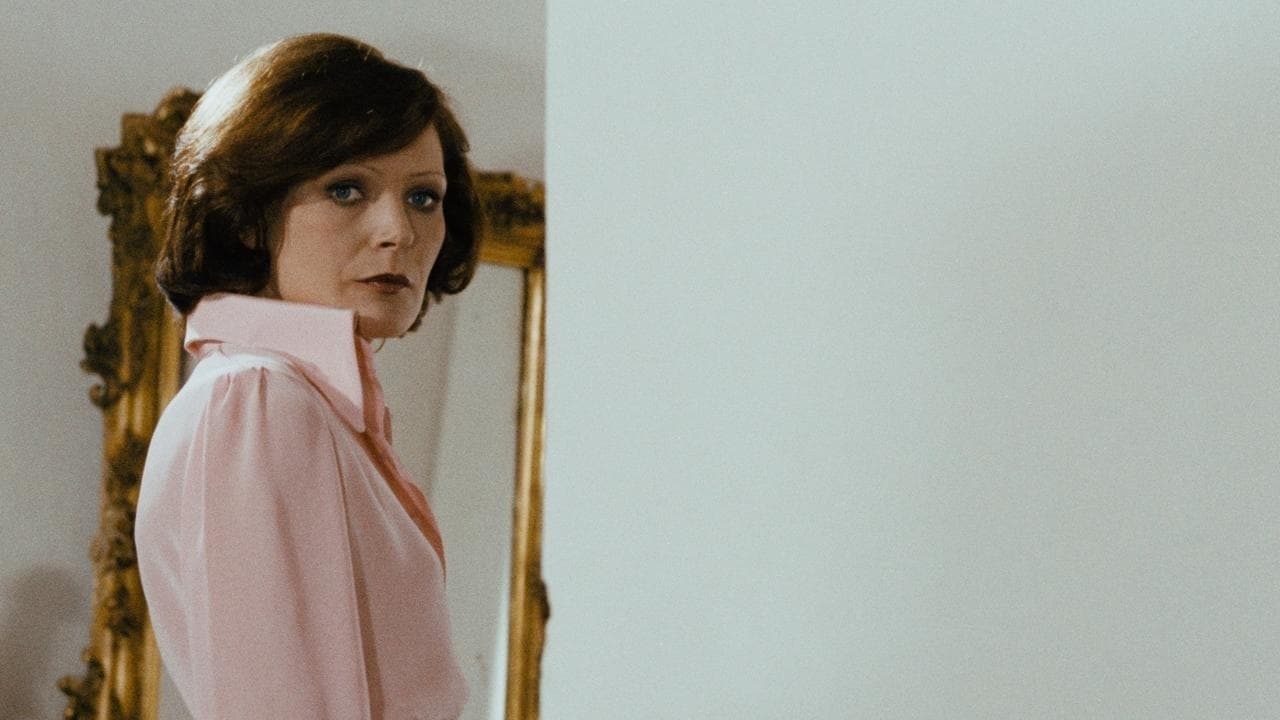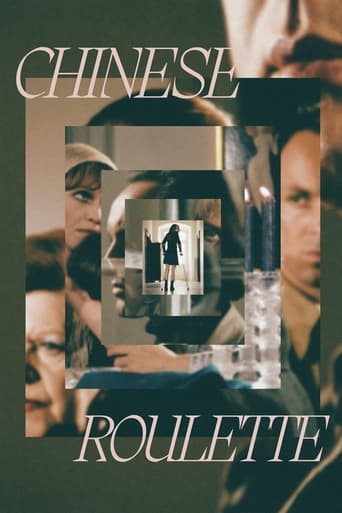

Best movie of this year hands down!
... View MoreSurprisingly incoherent and boring
... View MoreHighly Overrated But Still Good
... View MoreOne of the film's great tricks is that, for a time, you think it will go down a rabbit hole of unrealistic glorification.
... View MoreBelieving that her parents' longtime extramarital affairs caused her physical ailments, a teenage cripple arranges for both sets of adulterers to unexpectedly meet at a country home in this Rainer Werner Fassbinder thriller. The film is gloriously photographed by Michael Ballhaus, with the camera giddily spinning around to reflect nervousness when the four adulterers first meet, and the very deliberate framing (some actors turned to faced the camera; others not) throughout adds tension. The juice of the film comes from both the girl's initially elusive motives and the sense of emotions about to explode; at one point, her own mother almost shoots her through an open window. Oddly, the film never explores why the daughter has more hostility towards her mother (and vice versa) than her father, but this aside, the only significantly underwhelming aspect of the film is the title game. Nowhere near as dangerous as Russian roulette on the surface, Chinese roulette -- a game that seems to only exist in the film's universe -- is merely a guessing game of sorts, albeit one in which deep resentment is able to surface. Whatever the case, the film is a surprisingly tense ride considering the minimal sets and small cast. It also offers food for thought in terms of who is to blame and whether indeed the girl's parents brought the situation upon themselves through emotionally (if maybe not physically) injuring their daughter.
... View MoreA R.W. Fassbinder double-feature binge (Chinese ROULETTE 1976 and QUERELLE 1982, his swan song) coincides with a starting point for me to access his oeuvre, as one of the pioneer of modern German cinema, Fassbinder has a burning-too-fast career orbit, as if he was exerting all his energy in cranking out films before his dooming self-indulgent suicide at the age of 37 (with more than 40 works done in 15 years). Yet two films must have its restricted view, but Fassbinder films' mindset nevertheless more or less could be conjectured from them, and his stylish flourish is also mesmerizingly toxic. Both films could adopt themselves comfortably into a theatrical play not the least courtesy of their (mostly or exclusively) in-door locales, for Chinese ROULETTE, it has a secular tone, 90% of the film takes place inside a rural mansion, with familial secrets, connubial deceptions, mother-daughter hatred, the divide of social strata, vindictive self-destruction viciously unfold and infuse a deleterious corruption even to the onlookers, all is triggered by the innocuous eponymous game. While QUERELLE is projected on more ritualized dark amber light sepia background setting stimulating a claustrophobic oppression of lust and desire within a handful locations (the faux-deck of a ship ashore, the phallus worship Hotel Feria Bar, an underground tunnel for hideaway), a male-dominant sexual obsession mingled with blatant homosexual thrust to an astounding incestuous extremity, brilliantly done via an intuitive candor. Mirror is a recurrent item in both films, exposes the other-half which reflects the true id inside one's soul, in Chinese ROULETTE the stunning flux of the stationary tableaux interlacing two or three out of the eight characters orchestrates a scintillating picture of a guilt-and-punishment visual symphony with swishy panache; in QUERELLE, mirrors reduce their occurrence but the conscientiously measured compositions transpire an even more ostentatious narcissism with a sultry plume of hormone-excreting rugged contours of male bodies. QUERELLE is adapted from Jean Genet's novel "QUERELLE DE BREST", whose literature text also introduced through the soothing voice-over of an unknown narrator, the film does stage a sensible amount of poetic license to filter a vicarious compassion through a singular mortal's inscrutable behavioral symptoms; in Chinese ROULETTE, a prose (or poem) soliloquy of androgyny also contrives to reach the same effect (but sounds a trifle recondite when contextualizing it under the film's incumbent situation). Anyhow Fassbinder is a trailblazer in defying the mainstream's prejudices, and very capable of visualize and dissect the tumor of humanity. The cast, there are 8 characters in Chinese ROULETTE, with almost equal weight in the screen time, but it is the youngest one, Andrea Schober (under Fassbinder's guidance for sure), the crippled girl seeks for revenge to her parents' betrayal and negligence, teaches all of us a lesson (how selfish we are to find a scapegoat for every bit of repercussions happen to us) with such acute insight, fearless audacity and extreme measures. While big name (Anna Karina) and other Fassbinder's regulars (Margit Carstensen, Brigitte Mira, Ulli Lommel) all end up licking their own wounds in the corner. In QUERELLE, Brad Davis (a real-life AIDS fighter then) is valiant, his masculinity and sinewy physique defies all the stereotyped treatment of gay men in the media, injecting a raw and visceral complexity into Querelle's spontaneous promiscuity and sporadic anger. Hanno Pöschl may fall short to guarantee the vigorous duality required for his two roles, but the gut- bashing combats (or playing) between two brothers fabricate the most erotic intimacy has ever been presented on the screen. Two veterans, Franco Nero is either recording his secret affection in the cabinet or wandering near Querelle from oblique angles; the fading beauty Jeanne Moreau, hums "Each man kills the things he loves", and is lost in her own fantasy of the banquet she can savor. Personally I incline towards QUERELLE's unconventional approach to kill off the ambiguities of sexual orientation and examine the most primal desire made with blood and flesh, but Chinese ROULETTE achieves another form of success, it maintains a serene aplomb above all the vile assault and bitter turbulence, like the unspecified pistol shot at the coda, no matter who bites the dust, a bullet is never an ultimate solution to all the problems.
... View More"Chinese Roulette", directed by R.W. Fassbinder (1976), is kind of a minimalist work, and, as it turns out, the quite right surrounding for a very special form of social terrorism as executed by a child.Also simple is the structure of the characters - and the more impressive, when you see during the movie which Eigen-dynamics it discloses: Gerhard Christ and his wife Ariane have a marriage that is founded on money. He has a girlfriend - the Parisian Irene, she has a boyfriend - the husband's collaborator Kolbe. But these are not the only couples in the movie: There is also mother Kast and son, Gabriel. And then there is an informal couple, Gerhard and Arianes daughter Angela and her nurse Traunitz. (Watch the names: Christ, Ariane vs. Irene, Gabriel, Angela. Who is the devil? The arch-angel Gabriel's mother or daughter Angela "the angel"?).Since everybody lied on everybody telling one another that they are going to Oslo, Milano and to the Zoo, they all meet quite unexpectedly in the family-castle. Now, everybody is unable to have his privacy with his respective boy- and girlfriend. So, one drinks and is bored until the handicapped daughter Angela desires to play "Chinese Roulette" (a play that has been invented by R.W. Fassbinder as a verbal analogy to Russian Roulette). Fassbinder said concerning this movie in an interview in my translation: "I think that relationships between humans are largely defined by conflicts. If I sit at my desk and just write something down without reflecting much, then there will probably be written more about conflicts than about attentions between humans".
... View MoreThis film brings together family members in an explosive situation involving sex. The tension steadily increases until violence erupts. You might say it occurs all the time with a thousand variations. As I watched the film it reminded me of the plays of Georges Feydeau, the great classic bedroom farces that continue to be presented all over the world.Feydeau's tactic is to bring together people in situations and circumstances that the participants would never in a thousand years want it to happen. Feydeau sees how ridiculous sex can be particularly when it leads to misbehavior, Fassbinder studies the tragedy sex can bring to a family, particularly where children are concerned. Personally I prefer the French touch.
... View More